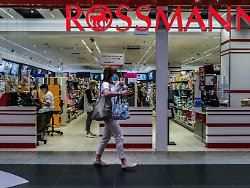Thursday, July 8th, 2021
No replenishment without a container
Kik and Rossman are missing the goods
Because of the container chaos on the world’s oceans, the warehouses of large traders are running empty. For many, the situation is dramatic, warn the bosses of Kik and Rossmann. Getting goods from Asia is becoming increasingly difficult. Customers would have to be prepared for supply bottlenecks and higher prices.
The chaotic conditions in global supply chains are increasingly becoming part of everyday life for consumers. “We have great difficulties in getting freight capacity for our orders on the ships”, quoted the “Handelsblatt” the boss of the textile discounter Kik, Patrick Zahn. “In the most important time of the year, we lack the goods.”
In view of the dramatically reduced freight capacities, the battle for containers is getting tougher. The result: the supply in this country is stagnating. With the scarce capacities on the world’s oceans, freight rates are climbing. Passing on the rising prices can no longer be avoided, warns the Kik boss. The textile retail chain obtains a large part of its range from Asia. “This is an attack on my business model,” said Zahn.
Many retailers are in a precarious situation. “The scarcity of freight capacities and containers has a significant impact on German retail,” said Raoul Roßmann, head of the Rossmann drugstore, to the “Handelsblatt”. “It is becoming more and more difficult to get the goods from Asia to the stores on time.” Roßmann is also convinced that the sharp rise in freight costs “will definitely lead to price increases in retail”.
Ordered goods will not be taken
Especially those who have not secured long-term transport capacities have major problems. In the sports market, a 40-foot standard container is four times as expensive today as it was a year ago. Ascending trend. The race for the few existing containers remains tight, even for those who can pay more. “We also experience that our goods are not taken away despite agreements because another customer is willing to pay more,” reports Kik boss Zahn. Other entrepreneurs are also alarmed. “We will get mega price increases”, says Marcus Diekmann, managing director of the bicycle dealer Rose Bikes.
Consumers will have to dig deeper into their pockets in the future. At 2.6 percent, the rate of inflation this year is likely to be as high as it has been since 2008, predicts the Kiel Institute for the World Economy (IfW). As a result of special effects such as the renewed increase in the temporarily reduced VAT and the introduction of the CO2 tax, the inflation rate could even have a four before the decimal point in individual months. “We will have to get used to higher inflation rates, even after the special effects of the pandemic are over,” said IfW President Gabriel Felbermayr.
According to a survey by the Munich Ifo Institute, around 92 percent of German companies complained about price increases for materials and preliminary products in June. “In the textile industry and in furniture production, the proportion was even 100 percent.” Rubber and plastic goods were hardly less affected at 99.4 percent. “There are delivery bottlenecks with steel and also with sawn timber and other wood-based raw materials and the associated sometimes dramatic price movements,” says Ifo expert Felix Leiss. What is scarce becomes more expensive. The prospects are not good for consumers.
.
